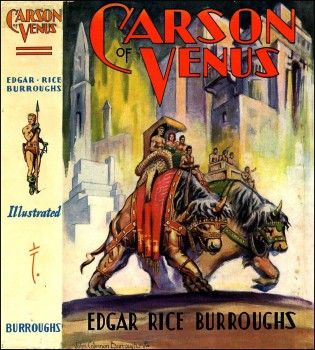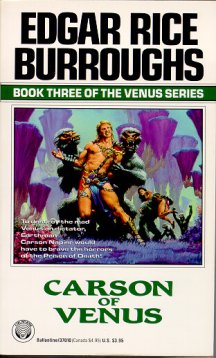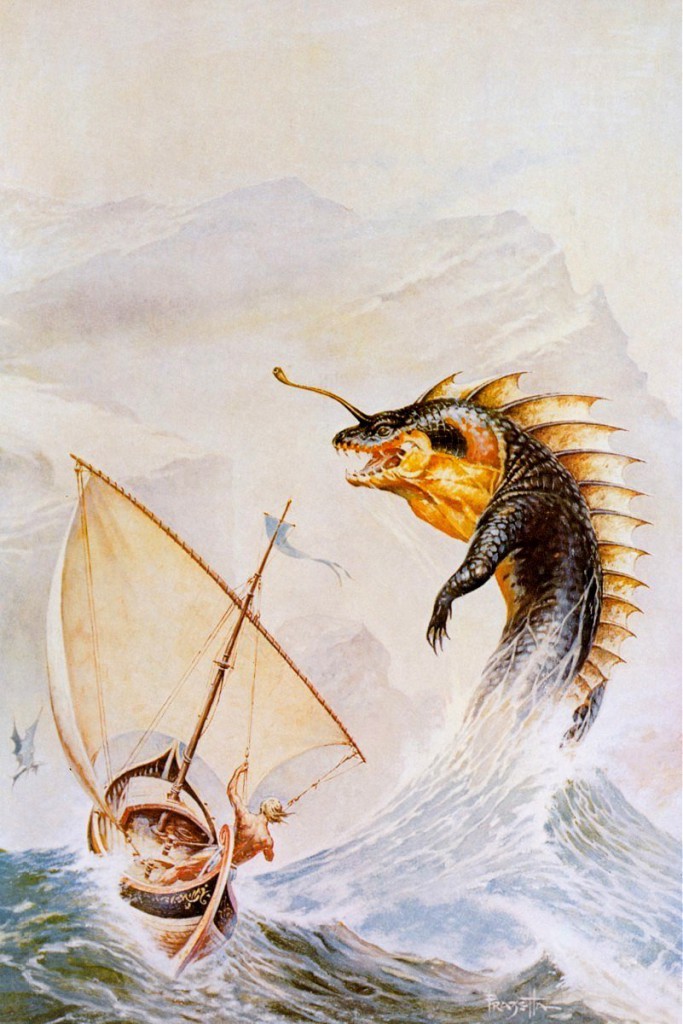Edgar Rice Burroughs’s Venus, Part 3: Carson of Venus
 Five years have passed since Edgar Rice Burroughs wrote Lost on Venus, and the world has undergone a startling and disturbing metamorphosis. Something sinister and confusing is taking place in Europe, and across the Atlantic waters the people of the United States are growing concerned at the saber-rattling of Nazi Germany. The poverty-crippled period in which ERB wrote the previous Venus books has given way to a time of escalating fear of a second great war.
Five years have passed since Edgar Rice Burroughs wrote Lost on Venus, and the world has undergone a startling and disturbing metamorphosis. Something sinister and confusing is taking place in Europe, and across the Atlantic waters the people of the United States are growing concerned at the saber-rattling of Nazi Germany. The poverty-crippled period in which ERB wrote the previous Venus books has given way to a time of escalating fear of a second great war.
Does this have anything to do with the next novel of the Venus saga, 1938’s Carson of Venus? Of course not. That the villains of the book are called “the Zanis,” and that they rule through a tyrannical personality-cult dictatorship complete with ritualized salutes, concentration camps, and rampant murder of political undesirables is mere coincidence.
Our Saga: The adventures of one Mr. Carson Napier, former stuntman and amateur rocketeer, who tries to get to Mars and ends up on Venus, a.k.a. Amtor, instead. There he discovers a lush jungle planet of bizarre creatures and humanoids who have uncovered the secret of longevity. Carson finds time during his adventuring in the various warring countries of the planet to fall for Duare, forbidden daughter of a king. Carson’s story covers three novels, a volume of connected novellas, and a final orphaned novella.
Previous Installments: Pirates of Venus (1932), Lost on Venus (1933)
Today’s Installment: Carson of Venus (1938)
The Backstory
Edgar Rice Burroughs was in a creative slump at the close of the 1930s. The success of the Johnny Weissmuller Tarzan films at MGM and the creation of his own publishing company meant a steady flow of revenue, but the famous author found his new fiction getting rejected from the regular magazine markets that had featured him for more than twenty years. Even Tarzan was no longer dependable. Burroughs was not a young man anymore, and the magazine rejections seemed to hint that his best writing years were behind him. At least he could always publish the books through his own company, but the publicity from magazine serialization was an important way to boost sales.
It was during this turbulent time that ERB tried a few experiments. After leaving the Venus series alone for five years, he returned to it with a spy story reflecting the political tensions of the day.
Burroughs must have had high hopes for Carson of Venus, because he submitted it to the major “slick” magazines of the time before turning to the pulps. Liberty, The Saturday Evening Post, Collier’s, and Ladies’ Home Journal all rejected the story. I can’t imagine a scenario where any of them would purchase this sort of science-fiction adventure, even if it were one of the author’s finest. (It isn’t.) The slicks didn’t have any use for this sort of genre literature.
Eventually, Burroughs sold the 68,000-word novel — the longest of the series — to the same magazine where he placed the other Venus adventures: Argosy. The magazine paid him $3,000 for it, and it ran in six issues from January 8 to February 12 at the start of 1938. Edgar Rice Burroughs Inc. published the hardcover in January 1939.
The Story
The novel opens with the obligatory prelude from the fictional ERB explaining that Carson’s telepathic powers, which the man never seems to use in his actual adventures, has permitted him to transmit to his amanuensis the latest chapter of saga on the second planet.
We switch to Carson and Duare in the handcrafted aeroplane (an anotar, as Duare calls it) over Venus’s seas. Carson lands the anotar on a continent to hunt game, and immediately a tribe of woman batter him unconscious and kidnap Duare. Here we go again…
 After an interlude with the Samary people, a culture where powerful women dominate subservient men, Carson and Duare escape and again take to the skies. Eventually, they arrive in the nation of Korva in the land of Anlap. They land the anotar in the city of Sanara, which is under siege by a group called the Zani. Under their leader, Mephis, this militaristic cult has seized all of Korva. Sanara is the only city that hasn’t fallen to the Zani, but its jong (king), Kord, is Mephis’s prisoner. Sanara is currently under the rule of Kord’s unpopular nephew, Muso. Muso asks Carson to go on a secret mission to the Zani capital of Amlot
After an interlude with the Samary people, a culture where powerful women dominate subservient men, Carson and Duare escape and again take to the skies. Eventually, they arrive in the nation of Korva in the land of Anlap. They land the anotar in the city of Sanara, which is under siege by a group called the Zani. Under their leader, Mephis, this militaristic cult has seized all of Korva. Sanara is the only city that hasn’t fallen to the Zani, but its jong (king), Kord, is Mephis’s prisoner. Sanara is currently under the rule of Kord’s unpopular nephew, Muso. Muso asks Carson to go on a secret mission to the Zani capital of Amlot
While undercover inside the enemy city, Carson meets the beautiful noble woman Zerka, who tells him that there is another jong imprisoned in the city. He came seeking his kidnapped daughter; Carson suspects the prisoner may be Duare’s father, Mintep.
Carson engages in further spy-adventures in Amlot, even going so far as to infiltrate the Zani. Among their ranks, he makes one firm friend, his trainer Mantar. He learns that Zerka is a rebel against the Zani, leading a secret force to overthrow them. Carson finds Duare’s father Mintep in the vaults, and events converge so Carson must escape from Amlot as soon as possible to deliver evidence to Sanara that Muso has been scheming all along with Mephis to betray his city to the Zani. Worse — at least for Carson personally — the traitorous Muso plans to force Duare to marry him.
The Zani at last fall, thanks to the scheming of Zerka’s counterrevolutionaries and the death of the main enemy leaders. But before Carson can return to Sanara, Mintep seizes Duare and flies away with her in the anotar; he would rather his daughter face the death penalty in Vepaja than have her end up with Carson. Although Carson wants to stay in Sanara as a hero, he must sail north to pursue Duare to Vepaja. Reunited, the lovers escape in the flying machine before her death sentence is carried out and fly back toward Korva.
The Positives
A major shift in style takes place in the third Venus/Amtor novel. Abandoning the standard pursuit-and-escape format, Burroughs makes Carson of Venus an espionage and war story. The action inside the city of Amlot, where Carson does undercover work among the Zani while learning about a conspiracy between the Hitler stand-in Mephis (“Maltu Mephis!” is the required public cry for all Zanis) and the Mussolini stand-in Muso to betray Sanara, is pure spy thriller material far removed from wilderness adventuring. In the last quarter of the book, the action shifts to a full war between Zani and the free city of Sanara.
 The Nazi-Zani link is glaring and obvious, but ERB has a good time with it, far more than with the Thorists-Communists of Pirates of Venus, who are now totally forgotten. Although this abandoning of a through-line is part of the overall problem with the Venus books, the loss of the Thorists is forgivable here since ERB found superior villains. The Zani are the best adversaries in the series: not only are they competent and ruthless, but they are also the source of ridicule and satire. Burroughs goes to great lengths to make their fascist rituals and bombast look ridiculous, such as having citizens stand on their heads while shouting out the “Maltu Memphis” chant, or having the chant begin and end every sentence of the conversation of some of the more brainwashed.
The Nazi-Zani link is glaring and obvious, but ERB has a good time with it, far more than with the Thorists-Communists of Pirates of Venus, who are now totally forgotten. Although this abandoning of a through-line is part of the overall problem with the Venus books, the loss of the Thorists is forgivable here since ERB found superior villains. The Zani are the best adversaries in the series: not only are they competent and ruthless, but they are also the source of ridicule and satire. Burroughs goes to great lengths to make their fascist rituals and bombast look ridiculous, such as having citizens stand on their heads while shouting out the “Maltu Memphis” chant, or having the chant begin and end every sentence of the conversation of some of the more brainwashed.
Burroughs’s imitation of a fascist European culture is often unnervingly accurate. Mephis is portrayed as a short man with a massive inferiority complex that has turned him into a murderous tyrant and megalomaniac. He forces all the theaters in Amlot to show installments of a hundred-episode play about his life, and attendance is mandatory of all citizens. People can get arrested for trivial or invented offenses. Scholars and intellectuals are despised — as is anyone whom the Zani fear might be superior to them. Carson offers many sarcastic observations on Zani pomposity: “I wondered at the time how Mephis could listen to such forced acclaim without feeling like the ass he was; but I suppose an ass doesn’t mind being as ass, or doesn’t realize it.” This is the same kind of vicious farce that Warner Bros. cartoons and Disney’s “Der Fuehrer’s Face” would unleash on the Nazis after the U.S. entered World War II. Burroughs was a bit ahead of the curve, and bravo to him for using the true real-world villains as his targets. It makes me feel better about the eugenics insanity of Lost on Venus. Plus, it’s good to see Burroughs using his stinging humor after its absence in the first two Venus novels.
Zerka is another supporting female character who upstages Duare. Since Duare has settled into the role of Carson’s unswerving love, there is little drama to her now except as the target of kidnappings. Zerka is the best character in all of the Venus novels, a wonderful combination of femme fatale and courageous freedom fighter/avenger. The mystery around her is wonderful: she’s a charming aristocrat in the middle of the spy game who may be playing Carson for her own ends. She also provides real pathos. In a candid moment with Carson, she speaks about her past, and ERB finds an emotional point in a series that hasn’t had many:
“It is not a waste of time to make new friends. I really have very few, you know. The war and the revolution took most of them — the war took my man.” She said ooljagan — loveman. “I have lived alone ever since — rather a useless life, I am afraid.”
Zerka also gets the best “hero” line: “Goodbye, Carson of Venus … I hope that you do come back and bomb hell out of the Zanis.” Come on, Carson, this is the woman you should be in love with.
To be fair, Duare rises up in this novel and takes a more active role: she flies the anotar to bomb the Zani into submission in the climatic war scenes. Duare has shown a tough side to her before, and now she gets to use it.
Although the conclusion of the book is lazy and dull, this is the first of the Venus novels to have a definitive ending and a sense of closure. If Burroughs intended a trilogy from the beginning, he achieved the right amount of finality here — even if he had to rush at the end to get it.
The Negatives
The middle stretch of Carson of Venus is solid, but the opening with the Samary people is terrible and the concluding trip to Vepaja is an anticlimax made of two rushed and tacked-on chapters. In the larger structural picture, it is as much a failure as the non-plot of Pirates of Venus. At least the heart of the book is enjoyable.
Burroughs created many inventive cultures in his novels, but the gender role-swap Samary people are nothing more than a one-line gag that show the writer on auto-pilot. I think a younger ERB might have gotten more satiric humor displaying men as the chattels of women, but the whole episode feels trite and a bit embarrassing. See, the men have “funny female names” like Lula, Emmie, and Vyla! And they chatter and gossip and are scared of everything! I can’t tell if Burroughs is satirizing the portrayal of women in pulp adventures, or if he thought stereotypical ideas of female behavior would sound hysterical coming out of men’s mouths. Either way, it’s neither funny nor interesting. It is also only a short flash at the beginning of the novel. Carson makes a tensionless getaway, once again avoiding anything applause-worthy, and the Samary never enter the story again. They kidnap Duare, Carson frees her, they escape — all without even short-term consequences. Why did ERB even include this?
 But the plot sloppiness continues: after leaving the Samary, Carson and Duare at last get back to Vepaja, their goal since the end of Pirates of Venus, only to immediately decide, “Ah, never mind,” and fly off to any random place they can find.
But the plot sloppiness continues: after leaving the Samary, Carson and Duare at last get back to Vepaja, their goal since the end of Pirates of Venus, only to immediately decide, “Ah, never mind,” and fly off to any random place they can find.
The betrayal of the promise of the middle of the book in the last chapters is the most frustrating aspect of Carson of Venus, although it is marginally better than the awful opening with the Samary. Entering the final stretch, ERB jettisons the Zani and dashes into an entirely new plot based on — you guessed it — a kidnapped princess. The fall of the Zani is so simple that it undermines their original threat, and it happens almost entirely out of Carson’s point-of-view. Burroughs then goes two chapters too far. Instead of leaving the story on a good cliffhanger possibility, where Carson is a nobleman of Korva but knows he must return to Vepaja and save Duare, the story plunges into two hasty-yet-boring chapters where Carson runs into pirates and then easily strides in and out of the Vepajan city of Kooad with Duare in tow.
Ye gods, Carson Napier, but are you ever going to do something proactive? The character’s passivity in Carson of Venus starts to get maddening. Perhaps it’s prudent to bide time within the enemy city of Amlot for the right time to act; but in an Edgar Rice Burroughs adventure, heroes should be bombastic and risk-taking, not sitting around knitting until it’s almost too late. The satiric punches made at the pseudo-Nazis are funny, but I would rather see the hero make actual punches at them. Also, considering the level of intelligence Carson has shown before, he is the last person anyone would trust on a spy mission.
A city-bound thriller plot isn’t the sort of narrative that Burroughs was adept with. Add to this a main character who needs things to happen to him more than anything else results in a middle stretch filled with plot strands that don’t tie together and finally just drop when Carson loses his cover and has to flee Amlot. It’s refreshing to see a spy story in place of ERB’s standard business, but it isn’t the most thrilling spy story.
Carson Napier acts so magnificently stupid in this book that the other characters needle him about it. He looks like an idiot from the first chapter, when he lands the anotar and instantly lets Duare get kidnapped and himself knocked unconscious. Carson actually considers not reading the secret message that Muso gives him to deliver to a spy in Amlot, even though Muso made it clear that the only reason he wanted Carson to carry the message was he believed that the earthman couldn’t read Amtorian. Carson later challenges Muso to a duel, which should be the novel’s action highlight; instead, Carson loses the fight and has to have a little girl shoot and kill villain to save him. It isn’t as funny as it sounds.
Carson’s crowning moment of idiocy is botching his escape from Amlot because he wants to drop in to pay a visit to Zerka for no reason at all. In response to this, Mephis asks him a reasonable question: “Don’t you think that was a little unwise, a little stupid?” Carson does have a good single-line take on his own character and why he isn’t cut out for intelligence work: “Alas, what stupid things one does!” No debate here.
At this point in the Venus series, the planet itself hardly matters. It has lost any sense of a coherent background. Burroughs’s Mars had many wonders, but they fit together in whole that felt like a real world. The early Pellucidar novels had the same sense of unity. But the promise that a Venusian epic of some sort might piece together from ideas introduced in the first two books sputters out here. Carson of Venus is the most epic installment of the series, but has the least connection to the overall “Venus epic.” Compare the first three Venus novels with the first three Mars novels, which form a complete trilogy, and the Venus series looks even wobblier.
By the way, the amazing Frank Frazetta covers with the huge sea monster on them attacking Carson’s boat? Nothing like this happens in Carson of Venus. Carson mentions seeing some sea beasts on his voyage at the end of the book, but that’s it.
Craziest bit of Burroughsian Writing: “Right then I would have given a lot for a rear-sight mirror; for I wanted to see what was going on behind us, but didn’t dare look back for fear of suggesting that we were doing something we shouldn’t be — it was a case of nonchalance or nothing, and not even a cigarette of any brand among us.” Wait, what was that last phrase again?
Most Triumphantly Stupid Carson Napier Moment: Instead of taking a fast trip out of Amlot with the rescued Mintep, Carson decides to swing by Zerka’s palace (because why not?), even though he knows she is under suspicion. He gets capture immediately, of course. If Zerka was his romantic interest, I might understand. But she isn’t, so what was the purpose in going back to see her?
Best Monster: The gantor, an elephantine creature used for transportation, is the only new animal in the novel, so I have to give this spot to the tharbans, the carnivores who were great fun in Pirates of Venus and carry on here.
Most Uncomfortable Moment for the Modern Reader: It’s not “uncomfortable” as it is “unintentionally hilarious,” but when Carson goes undercover in the city of Amlot, he chooses the name “Homo” as his false identity. Because Homo sapien; makes sense. Oh, English — how you change!
Carson Napier and the Sexual Revolution: “The word that Taman used instead of wife was ooljaganja — lovewoman. I like it.”
Should ERB have continued the series? No. It feels finished. Carson has come full circle on Venus. Unless Burroughs changes heroes, as he did in Pellucidar and Barsoom, this is a good place to stop.
Next Up: Escape on Venus
Ryan Harvey is one of the original bloggers for Black Gate, starting in 2008. He received the Writers of the Future Award for his short story “An Acolyte of Black Spires,” and his stories “The Sorrowless Thief” and “Stand at Dubun-Geb” are available in Black Gate online fiction. A further Ahn-Tarqa adventure, “Farewell to Tyrn”, is currently available as an e-book. Ryan lives in Los Angeles. Occasionally, people ask him to talk about Edgar Rice Burroughs or Godzilla in interviews.
[…] Previous Installments: Pirates of Venus (1932), Lost on Venus (1933), Carson of Venus (1938). […]
[…] Installments: Pirates of Venus (1932), Lost on Venus (1933), Carson of Venus (1938), Escape on Venus […]
In the “Craziest bit of Burroughsian writing,” the word “ease” is a misprint for “case”–“it was a case of nonchalance or nothing . . .”
[…] Rice Burroughs wrote Synthetic Men of Mars in 1938, soon after Carson of Venus and a potboiler Tarzan adventure, Tarzan and the Forbidden City, and right before the dreadful […]
Yeah, this book was a snoozefest if iam honest. I know ERB has written contemporary style books, his westerns are excellent but Carson of Venus with its Spy thriller is quite dry.